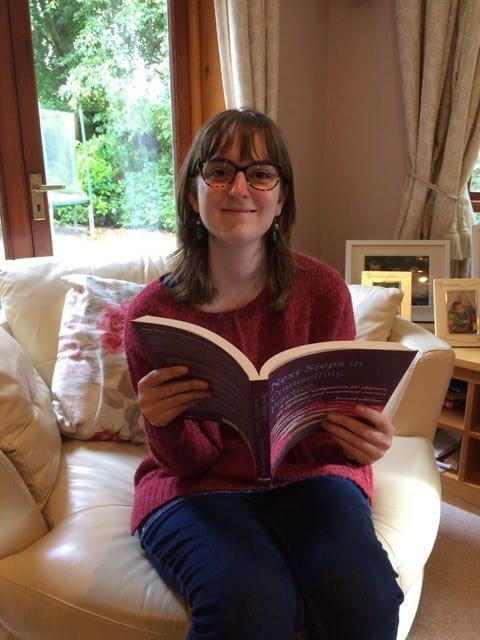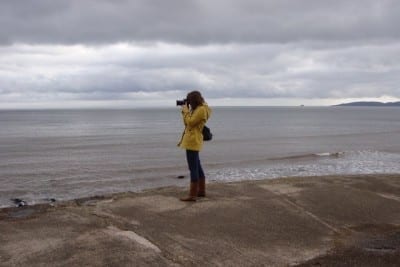 How having TSC and TS-related LAM has influenced my career path
How having TSC and TS-related LAM has influenced my career path
My name is Zoë and I am mildly affected by Tuberous Sclerosis Complex and TSC-related LAM (or ‘lymphangioleiomyomatosis). I hadn’t given much thought to how TSC and LAM have influenced my career path, but it seemed very natural to me to be looking through interactive science books, as a child, that had colourful fold-out diagrams of the human body and facts about how the brain works; how our senses function or how our food is digested.
However, it is no surprise that I was interested in the workings of the human body, because for as long as I can remember, I have had routine medical check-ups to make sure that my body was running how it should. I wanted to be a doctor like the ones I would visit and wear a stethoscope around my neck. Having my height and weight monitored, along with injections and inspections of my eyes and ears, was just part of growing up for me.
I was unaware, though, of the realities of being a doctor or even a nurse. It wasn’t just about dressing up at home and pretending to play the part, it involved more complex matters like working with various illnesses or looking at patients’ injuries that I wouldn’t want to face.
When I was eight-years-old, my parents told me officially about having Tuberous Sclerosis and I wanted to reject everything medical, including facing the fact that I had a health condition myself. I no longer had any desire to take people’s blood pressure or feel curious about what goes on inside the body. It was bad enough having to face these things myself.
A few years later, I took an interest in my mum’s little book on the Zodiac star signs and was curious as to how the position of the planets could influence someone’s personality. I could relate to being a determined Aries, but couldn’t connect to the outgoing character traits that were illustrated in the book. This led me to further reading on Introversion and Extraversion, where I discovered I can be overstimulated by too much noise and socialising, needing to retreat to a quiet place so I can recharge.
I hadn’t realised I had developed such an interest in personality psychology until I had some sessions of Cognitive Behavourial Therapy (CBT) at nineteen. The transition from adolescence to adulthood had made me extremely anxious, but during the therapy, I realised that many of my fears were health related. In a horrible twist of fate, my anxiety played a part in the kidney bleed I had in 2013, and the naturally increased levels of oestrogen spurred on the TSC-related LAM and the lung collapses I had two years later.
I was sure after my therapy, I wanted to be a counsellor. I was interested in people; I wanted to help and understand them. I had been through enough to be able to empathise with client problems, but I had just achieved a BA (hons) degree in Digital Photography because I had wanted to be wedding photographer.
 There was difficult month after my degree on which direction to go in, but I realised I didn’t want to run a photography business and I didn’t enjoy telling people how to stand in their photos; I preferred taking pictures of nature and doing photography as a hobby.
There was difficult month after my degree on which direction to go in, but I realised I didn’t want to run a photography business and I didn’t enjoy telling people how to stand in their photos; I preferred taking pictures of nature and doing photography as a hobby.
As a way of helping people and taking photos, I began volunteering for the TSA in 2014. I wrote an article about it in the SCAN Spring 2015 issue and took new photos of the TSA staff for the magazine. This led to helping out at the Outlook event in 2016 where we all dressed up in 1920s outfits for the 20th anniversary of the support group. It was a great opportunity to take the photos and be a part of it, but I still wasn’t 100% confident photographing people.
I definitely felt more confident in a supportive role and had begun my job as a Support Worker for The Royal Mencap Society, working with adults with mild to moderate learning disabilities and promoting their independence. Having TSC played a big role in attaining this job as I knew what it was like to feel different and the ups and downs of living with a health condition. I wasn’t scared of the people I support and could accept them for who they were.
Working part-time at Mencap meant I could also focus on my counselling training at the same time. I began an introductory course at the Tavistock and Portman NHS Trust and transitioned onto to the Counselling and Psychotherapy Training Academy (CPTA), studying Counselling Skills Level 2 and Counselling Studies Level 3.
I have now finished my first year on the two-year CPTA Level 4 Diploma in Therapeutic Counselling, and recently began my volunteer placement at a local sixth-form college. Through counselling, I have been able to come to terms with having TSC and LAM, and that has helped me to understand the students I counsel on my placement. With any luck, I will be a qualified counsellor.
Zoë Bull
Make a one off or regular donation
£10 Can allow us to send a welcome pack to a family who has just received a life-changing TSC diagnosis, ensuring that they do not go through this time alone.
£25 Can help us develop materials that are included in our support services, flagship events or campaigns.
£50 Can provide laboratory equipment for a day’s research into the causes, symptoms, management or treatment of TSC.





